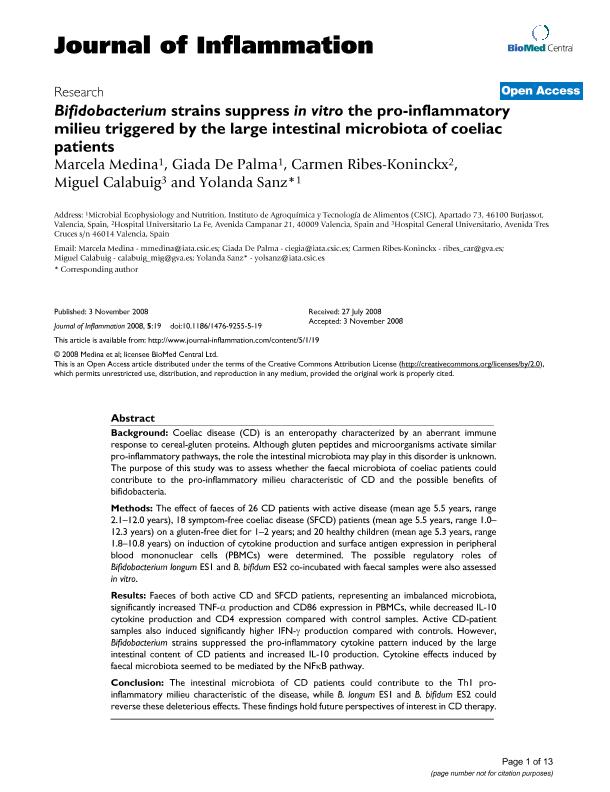Artículo
Bifidobacterium strains suppress in vitro the pro-inflammatory milieu triggered by the large intestinal microbiota of coeliac patients
Fecha de publicación:
06/11/2008
Editorial:
BioMed Central
Revista:
Journal Of Inflammation
ISSN:
1476-9255
Idioma:
Inglés
Tipo de recurso:
Artículo publicado
Clasificación temática:
Resumen
Background. Coeliac disease (CD) is an enteropathy characterized by an aberrant immune response to cereal-gluten proteins. Although gluten peptides and microorganisms activate similar pro-inflammatory pathways, the role the intestinal microbiota may play in this disorder is unknown. The purpose of this study was to assess whether the faecal microbiota of coeliac patients could contribute to the pro-inflammatory milieu characteristic of CD and the possible benefits of bifidobacteria. Methods. The effect of faeces of 26 CD patients with active disease (mean age 5.5 years, range 2.1-12.0 years), 18 symptom-free coeliac disease (SFCD) patients (mean age 5.5 years, range 1.0-12.3 years) on a gluten-free diet for 1-2 years; and 20 healthy children (mean age 5.3 years, range 1.8-10.8 years) on induction of cytokine production and surface antigen expression in peripheral blood mononuclear cells (PBMCs) were determined. The possible regulatory roles of Bifidobacterium longum ES1 and B. bifidum ES2 co-incubated with faecal samples were also assessed in vitro. Results. Faeces of both active CD and SFCD patients, representing an imbalanced microbiota, significantly increased TNF-α production and CD86 expression in PBMCs, while decreased IL-10 cytokine production and CD4 expression compared with control samples. Active CD-patient samples also induced significantly higher IFN-γ production compared with controls. However, Bifidobacterium strains suppressed the pro-inflammatory cytokine pattern induced by the large intestinal content of CD patients and increased IL-10 production. Cytokine effects induced by faecal microbiota seemed to be mediated by the NFκB pathway. Conclusion. The intestinal microbiota of CD patients could contribute to the Th1 pro-inflammatory milieu characteristic of the disease, while B. longum ES1 and B. bifidum ES2 could reverse these deleterious effects. These findings hold future perspectives of interest in CD therapy.
Palabras clave:
Celiac Disease
,
Bifidobacteria
,
Intestinal Microbiota
,
Imflammation
Archivos asociados
Licencia
Identificadores
Colecciones
Articulos(CERELA)
Articulos de CENTRO DE REFERENCIA PARA LACTOBACILOS (I)
Articulos de CENTRO DE REFERENCIA PARA LACTOBACILOS (I)
Citación
Medina, Marcela Susana; de Palma, Giada; Ribes Koninckx, Carmen; Calabuig, Miguel; Sanz, Yolanda; Bifidobacterium strains suppress in vitro the pro-inflammatory milieu triggered by the large intestinal microbiota of coeliac patients; BioMed Central; Journal Of Inflammation; 5; 19; 6-11-2008; 1-13
Compartir
Altmétricas




